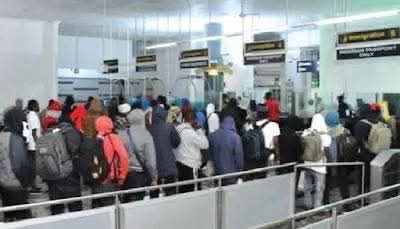US Deports Over 2,300 Nigerians With 3,690 More Facing Removal
By Tope Kolawole
The United States Immigration and Customs Enforcement (ICE) has deported at least 2,310 Nigerian nationals between 2014 and 2024, according to a comprehensive review of the agency’s annual reports, highlighting a sustained effort to enforce immigration laws amid fluctuating enforcement priorities.
The data, compiled from ICE’s statistical reports spanning 2014 to 2024, shows a total of 2,310 removals over the 11-year period, with an additional 20 deportations recorded in early 2025, bringing the cumulative figure to 2,330.
Nigeria leads Africa in total U.S. removals, surpassing Somalia (1,539), Ghana (1,380), and Senegal (1,122).
The trend reveals a 47.1% decline from 261 deportations in 2014 to 138 in 2024, though numbers spiked during the first Trump administration—peaking at 369 in 2018—and dipped sharply under President Joe Biden, hitting a low of 49 in 2022 amid pandemic restrictions.
Yearly breakdowns indicate: 261 in 2014, 224 in 2015, 242 in 2016, 312 in 2017, 369 in 2018, 286 in 2019, 199 in 2020, 78 in 2021, 49 in 2022, 152 in 2023, and 138 in 2024.
The resurgence in 2023 and 2024 coincides with a Supreme Court ruling in July 2024 reinstating stricter enforcement guidelines, prioritizing public safety and national security cases.
ICE defines “removal” as the compulsory departure of non-citizens following a final order, often due to unlawful entry, visa overstays, fraud, criminal convictions, or security concerns under the Immigration and Nationality Act.
As of late 2024, 3,690 Nigerians remain on ICE’s non-detained docket with final removal orders, part of a broader 1.4 million non-citizens nationwide facing deportation.
The figures underscore Nigeria’s position as a major source of African migration to the U.S., driven by economic challenges, insecurity, and opportunities abroad.
Nigerians in Diaspora Commission (NiDCOM) spokesperson Abdur-Rahman Balogun affirmed readiness to reintegrate returnees, noting an inter-agency committee involving the Ministries of Foreign Affairs and Humanitarian Affairs to handle potential mass deportations humanely.
“We insist on dignified returns and support for deportees to rebuild their lives,” Balogun said.
Critics, including immigration advocates, argue the deportations exacerbate family separations and economic strain on Nigeria, where remittances from the U.S. diaspora exceed $20 billion annually.
With Donald Trump’s return to office in 2025 signaling intensified enforcement, experts predict further rises in Nigerian removals, echoing the 30% arrest surge post-Executive Order 13768 in 2017.
The Nigerian government has urged bilateral talks to address root causes, emphasizing mutual cooperation on migration management.

